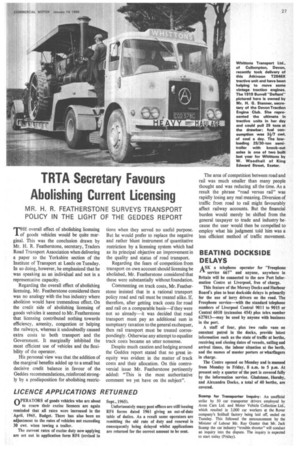TRTA Secretary Favours Abolishing Current Licensing
Page 29

If you've noticed an error in this article please click here to report it so we can fix it.
MR. H. R. FEATHERSTONE SURVEYS TRANSPORT POLICY IN THE LIGHT OF THE GEDDES REPORT THE overall effect of abolishing licensing of goods vehicles would be quite marginal. This was the conclusion drawn by Mr. H. R. Featherstone, secretary, Traders Road Transport Association when delivering a paper to the Yorkshire section of the Institute of Transport at Leeds on Tuesday. In so doing, however, he emphasized that he was speaking as an individual and not in a representative capacity.
Regarding the overall effect of abolishing licensing. Mr. Featherstone considered there was no analogy with the bus industry where abolition would have tremendous effect. On the credit side of abolishing licensing of goods vehicles it seemed to Mr. Featherstone that licensing contributed nothing towards efficiency, amenity, congestion or helping the railways, whereas it undoubtedly caused extra costs to both transport and the Government. It marginally inhibited the most efficient use of vehicles and the flexibility of the operator.
His personal view was that the addition of the marginal benefits added up to a small but decisive credit balance in favour of the Geddes recommendations, reinforced strongly by a predisposition for abolishing restric tions when they served no useful purpose. But he would prefer to replace the negative and rather blunt instrument of quantitative restriction by a licensing system which had as its principal objective an improvement in the quality and status of road transport.
Regarding the fears of competition from transport on own account should licensing be abolished, Mr. Featherstone considered that these were substantially without foundation.
Commenting on track costs, Mr. Featherstone insisted that in a rational transport policy road and rail must be treated alike. If, therefore, after getting track costs for road and rail on a comparable basis—if they were not so already—it was decided that road transport must pay an additional sum in sumptuary taxation to the general exchequer, then rail transport must be treated correspondingly. Otherwise any attempt to equali7e track costs became an utter nonsense.
Despite much caution and hedging around the Geddes report stated that no great inequity was evident in the matter of track costs and their allocation. On this controversial issue Mr. Featherstone pertinently added: "This is the most authoritative comment we yet have on the subject". The area of competition between road and rail was much smaller than many people thought and was reducing all the time. As a result the phrase "road versus rail" was rapidly losing any real meaning. Diversion of traffic from road to rail might favourably affect railway accounts. But the financial burden would merely be shifted from the general taxpayer to trade and industry because the user would then be compelled to employ what his judgment told him was a less efficient method of traffic movement.
















































































































































